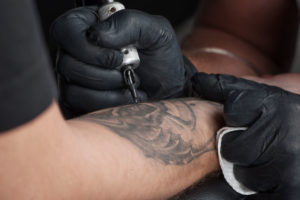A Tattoo Parlor’s Beautiful Response to Ugly Tattoos

It seems like the world is consumed by hate. Every day our newsfeeds and media alerts are filled with story after story of rhetoric fueled by hate and fear mongering, senseless bombings abroad and tragic shootings at home, or the Trump administration’s attempts at a societal rollback that threatens our civil liberties. At times, it’s hard to wake up with anything resembling a positive attitude, thinking you can make a difference and change minds, hoping the world won’t simply self-destruct, and that good people really do exist and can make a difference.
As humanists, we stand firm in the belief that everyone possesses the capacity for being good without a god—even if the belief in a god is there, people are at their core “good” and have the capability of being open-minded and well-informed enough to make fair and just decisions that end in positive outcomes. We also believe people are highly influential creatures and can be negatively prejudiced by their environment, but that those same people have the ability to change through knowledge and enlightenment.
Dave Cutlip thought the same thing when he decided to lend his services to the betterment of his community. Dave and his wife Elizabeth Cutlip are the owners of Southside Tattoos in Brooklyn Park, Maryland, just south of Baltimore. Throughout his long career as a tattoo artist, Dave has seen a lot of tattoos with thousands of meanings—some sentimental, some uniquely personal, and some simply hateful. When a man walked into his tattoo parlor in January with the hopes of having a tattoo removed from his face, Cutlip knew he had to do something. He and Elizabeth began promoting free tattoo cover-up services on social media for individuals with racist or gang tattoos, with the promise of no questions asked nor judgment passed.
This idea came to him quite suddenly, Cutlip told NPR: “If we can just erase hate one tattoo at a time, then we’re all doing something.” In the process, he found many of the hateful tattoos people wanted removed or covered over reflected the only way of life these people had ever known. One man had a confederate flag with a noose at the bottom, Cutlip recalled. “He said that growing up where he grew up, that’s how things were, and now that he has a job and has kids, he doesn’t believe in that anymore, and I definitely believed him.” Another customer had “white” tattooed on one forearm and “power” on the other, tattoos he got in prison where membership in a group provided a level of protection but that broadcast a message of hate in his post-incarceration life.
After an outpouring of support for their work, the Cutlips started a GoFundMe campaign under the name Random Acts of Tattoo. They’ve raised just over $13,000 and hope to start a worldwide collective of tattoo artists to do similar cover-ups.
Tattoos aren’t simply a means of decorating skin or holding on to a memory—they can be a means of identity and communication. Tattooing can be a great source of regret and pain for reformed racists and gang members. In a world where empathy for such people is rare, it’s inspiring to see someone have enough faith in those who’ve caused others pain to lend a hand in order to help them change. And while Cutlip is in no way defending the past actions of some of these people, he certainly doesn’t believe in continuing a cycle of hate and hopes this one act of kindness will cause a domino effect of countless more.
